The Mother of All Duck Calling Championships
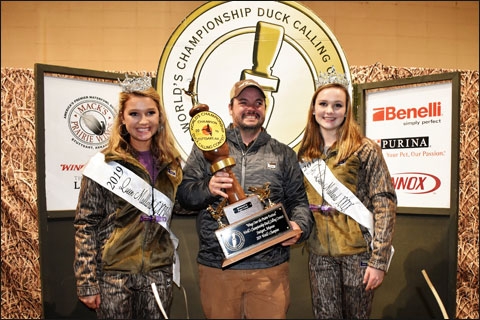
Imagine if you will a place where children learn to blow a duck call before entering first grade. It is a place where the dress of the day from November through March is some brand of camo and a radio station’s call letters are KWAK. If you’re a duck hunter, you’ve most likely heard of this place. We’re talking about Stuttgart, Arkansas. It is a farm town of around 9,000 inhabitants. Most of those residents are in the farming business with rice being the primary crop.
Some years ago, Stuttgart became known as the Rice and Duck Hunting Capital of the World, and during Thanksgiving week it is home to the World’s Championship Duck Calling Contest. This very American event has been staged in Stuttgart on Thanksgiving weekend for the past 84 years.
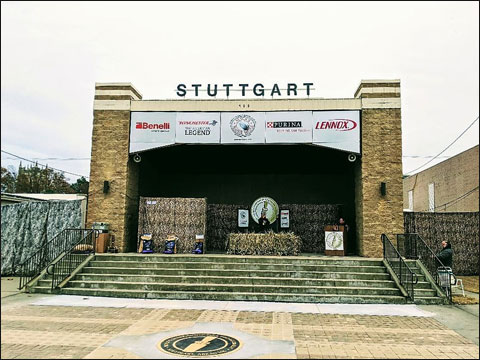
The calling contest is the crowning event of the Wings Over the Prairie festival, which lasts all of Thanksgiving week, but the festival offers attendees much more than folks in camo blowing duck calls. In addition to the duck calling contest, a Senior and Junior Queen Mallard are crowned early in the week. A youth calling contest is held with kids, mostly under 10 years of age that have been enrolled in duck calling classes for months leading up to the event. The calling classes are hosted by former World Champion duck callers from the area. Many of them got their start in those same youth duck calling events in their childhood days. There’s also a 5K and 10K Duck Run as well as a big party called the World Duck Gumbo where attendees must be 21 years of age to attend. Now that’s a party.
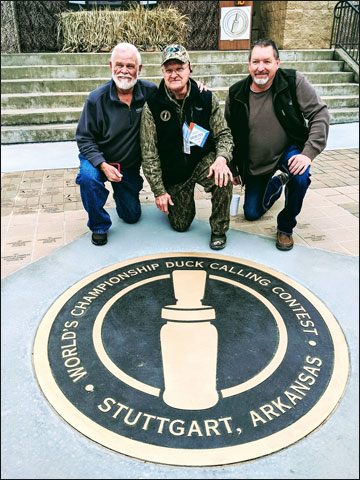
During the Festival, Main Street in Stuttgart is closed down as a carnival with rides for kids of all ages, tents full of items for viewing and purchase (arts and crafts, collectables, duck calls and related paraphernalia), refreshment and food vendors, and much more block any possible traffic from driving by the many businesses. For most of the contest’s history the actual competition was held in the middle of Main Street as a stage on wheels was pulled into the middle of the street. In recent years, the city actually constructed a large contest stage with judges’ cubicles positioned behind the callers. This stage is now a permanent part of the Stuttgart downtown landscape.
As far as the World Championship contests are concerned, there’s a Junior World, Intermediate World, Ladies World, a Chick and Sophie Major Memorial Championship for high school seniors only, the Arkansas State Championship and a Last Chance Regional Championship and of course the main World Championship which culminates the week’s events. Every five years the event includes a Senior World Championship for callers 55 and older and a Champion of Champions event for former World Champions.
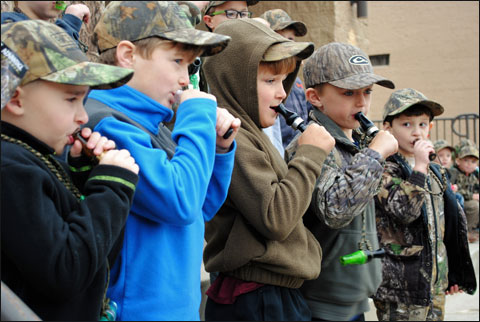
The contests in Stuttgart are what competition callers refer to as “Main Street,” so named because of the calling style and the fact that the event is held on Main Street in town. There are live duck and meat calling championships held in other parts of the country, but this is most certainly the granddaddy of them all.
To be a contestant in the main championship, a caller will have to win a contest sanctioned by the Stuttgart Chamber of Commerce and the World Championship calling contest committee. There are almost 60 of these sanctioned events across the country in the form of state and regional championships. Each year only the defending World Champion is automatically qualified.
For most duck hunters, calling judges, as they say in contest circles, is looked upon with a scrutinous eye, since the contest calling routine or sequence is far different from hunters in the field actually working a flock of ducks into the decoys.

Calling contestants perform a routine that simulates calling a flock of ducks from a distance into an imaginary set of decoys, but the ducks they are calling do exactly what they want them to do. They have 90 seconds to perform this routine which must include a hail call, which is used to attract ducks from a long distance, a feed call, which callers use when the ducks get close, comeback call to turn the flock back toward the decoys in case the birds didn’t land and lonesome hen or mating call, which is used to finish the contest sequence. These different calls are put into a melodic routine where the caller is charged with getting the most out of his duck call while working this imaginary flock of birds into his decoy spread.
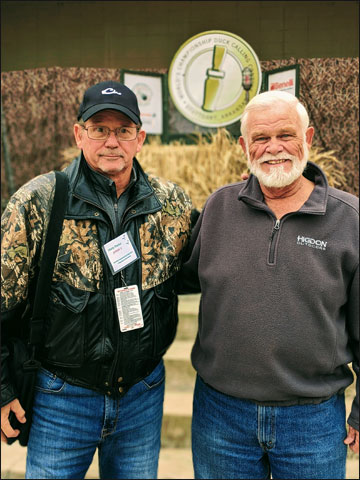
The acoustics from the judge’s chair are remarkable, as each judge can hear every slight squeak, variance of air through the call and every note the caller makes as he runs the call up and down the scale of notes that a properly tuned call will make. A competition duck call will actually make almost a full octave of notes, just like a musical instrument. Live ducks run up and down this scale of notes when they are vocal and contest callers must be able to do it as well.
In the end the judging is based on which competitor best simulates calling a flock of ducks into a set of decoys while getting the absolute most out of his duck call. Make no mistake, calling judges is very different from calling live ducks. There are five judges and the high and low score of each competitor is discarded. Competitors perform three 90 second rounds, with a percentage of callers eliminated after each round.
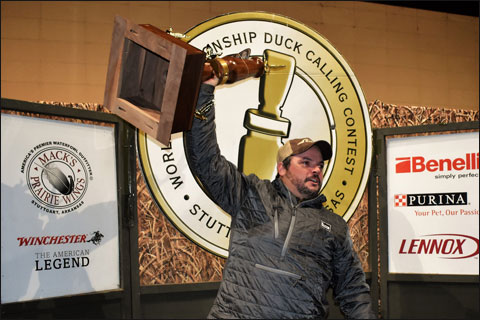
As difficult as it is for the judges to choose a winner from a field of champion callers, there is a winner. Michael Steinmeyer of Jackson, Missouri is the 2019 World Duck Calling Champion. Steinmeyer won the M&D Outfitters regional championship in Blytheville, Arkansas to qualify for the 2019 event.
Stuttgart, Arkansas and the World’s Championship Duck Calling Contest are truly iconic names that are synonymous with the best of the best waterfowl calling. The duck hunting is really good there too, so if you’re looking for a great place to enjoy a great small-town America event, the Wings Over the Prairie Festival and World’s Championship Duck Calling Contest might just fit the bill.
Marty Fischer is a designer and consultant for outdoor shooting facilities worldwide, primarily clay target (trap, skeet, sporting clays) facilities. To date he has designed more than 150 facilities in four countries. He is also a nationally recognized shooting instructor with 35+ years of experience, host of Marty Fischer’s Wing & Clay Nation radio, an outdoor writer, author of two books, “The Gun Digest Book of Shotgunning” and “Limbhangers and 4-Letter Words.” He is also the host of five instructional hunting and shooting videos. Find Marty on Facebook at www.wingandclayradio.com or on Facebook at www.facebook.com/wingandclayradio

Marty Fischer is a designer and consultant for outdoor shooting facilities worldwide, primarily clay target (trap, skeet, sporting clays) facilities. To date he has designed more than 150 facilities in four countries. He is also a nationally recognized shooting instructor with 35+ years of experience, host of Marty Fischer’s Wing & Clay Nation radio, an outdoor writer, author of two books, “The Gun Digest Book of Shotgunning” and “Limbhangers and 4-Letter Words.” He is also the host of five instructional hunting and shooting videos. Find Marty on Facebook at www.wingandclayradio.com or on Facebook at www.facebook.com/wingandclayradio


Comments